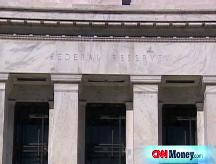Dear Ben: Leave rates alone!
A rate cut is looking increasingly likely but instead of solving the credit crunch, lower rates will only punish savers, hurt the dollar and possibly bring back inflation fears.
NEW YORK (CNNMoney.com) -- Mr. Bernanke, while this is without doubt an unprecedented time in the history of Wall Street, please resist the urge from jittery Wall Street types to cut rates again later today.
Yes, with Lehman Brothers (LEH, Fortune 500) filing for bankruptcy and Washington Mutual (WM, Fortune 500) and AIG (AIG, Fortune 500) both teetering on the edge of collapse, the Federal Reserve must try to restore confidence in the nation's fragile financial system.
But a rate cut won't help other than to maybe give a fleeting psychological boost to short-term traders.
Instead, lowering interest rates would just further punish savers (there are some of us out there!), responsible individuals who have shown more fiscal responsibility than any of the big Wall Street financial firms.
With the federal funds now rate at 2%, down from 5.25% a year ago, people who have been saving or trying to live off of fixed incomes tied to what, in theory, should be high-yield accounts, are paying the price.
The average money market account yields just 2.4% while a 1-year CD has a yield of only 3.69%. Inflation, meanwhile, is running at 5.4%.
With the dollar rallying in recent weeks and oil prices plummeting nearly $50 a barrel from their record high in July, it's tempting to say inflation is dead.
However, a rate cut could spark a new sell-off in the dollar unless the Fed is able to convince other foreign central banks to also lower rates. If the gap between U.S. interest rates and European rates widen any further, that is not good news for the greenback.
Finally, anybody who would accuse the Fed of doing nothing to try and end the financial crisis is a fool.
The Fed has hardly been aloof during the past year. In addition to the seven rate cuts, the central bank has created new ways to loan money to banks and even investment banks. It has been injecting massive amounts of liquidity into the banking system on a daily basis.
It also appears that this weekend's summit with top banking executives and regulators at the offices of the New York Federal Reserve, while failing to rescue Lehman, yielded some other productive developments.
Late Sunday night, a group of 10 banks announced they were creating a superfund, a pool of $70 billion that the most troubled financial firms will be able to tap for short-term borrowing needs.
And Bank of America, instead of buying Lehman, decided to merge with Merrill Lynch instead. Clearly, a wave of consolidation is about to sweep over the banking sector, just as it did in the wake of the savings and loan debacle nearly 20 years ago.
Sure, not all of the weakest firms will find saviors. But it does seem that many of the stronger banks will try and take advantage of this turmoil to get bigger.
But if anything, this past weekend appeared to prove that the Fed and Treasury are no longer willing to bail out financial firms after already doing so for Fannie Mae, Freddie Mac and Bear Stearns. The message is loud and clear: the government is there to help but ultimately, Wall Street needs to solve this crisis itself.
With all this in mind, the Fed should continue to concentrate on the other methods it is has been employing to try and soothe jittery investors and assist floundering banks, and not cut rates.
The market's reaction over the past two days is a sign that investors are still nervous. A rate cut is not going to suddenly make Wall Street's credit crunch fears go away.
All it will do is make it harder for average Americans trying to save during this period of tumult to actually earn decent interest on that money.
But what do you think. Please tell me at our Talkback page if you believe the Fed should lower rates again. Also, feel free to comment about yesterday's column on AIG and the Dow. Sorry there was no Talkback yesterday on that one. ![]()



